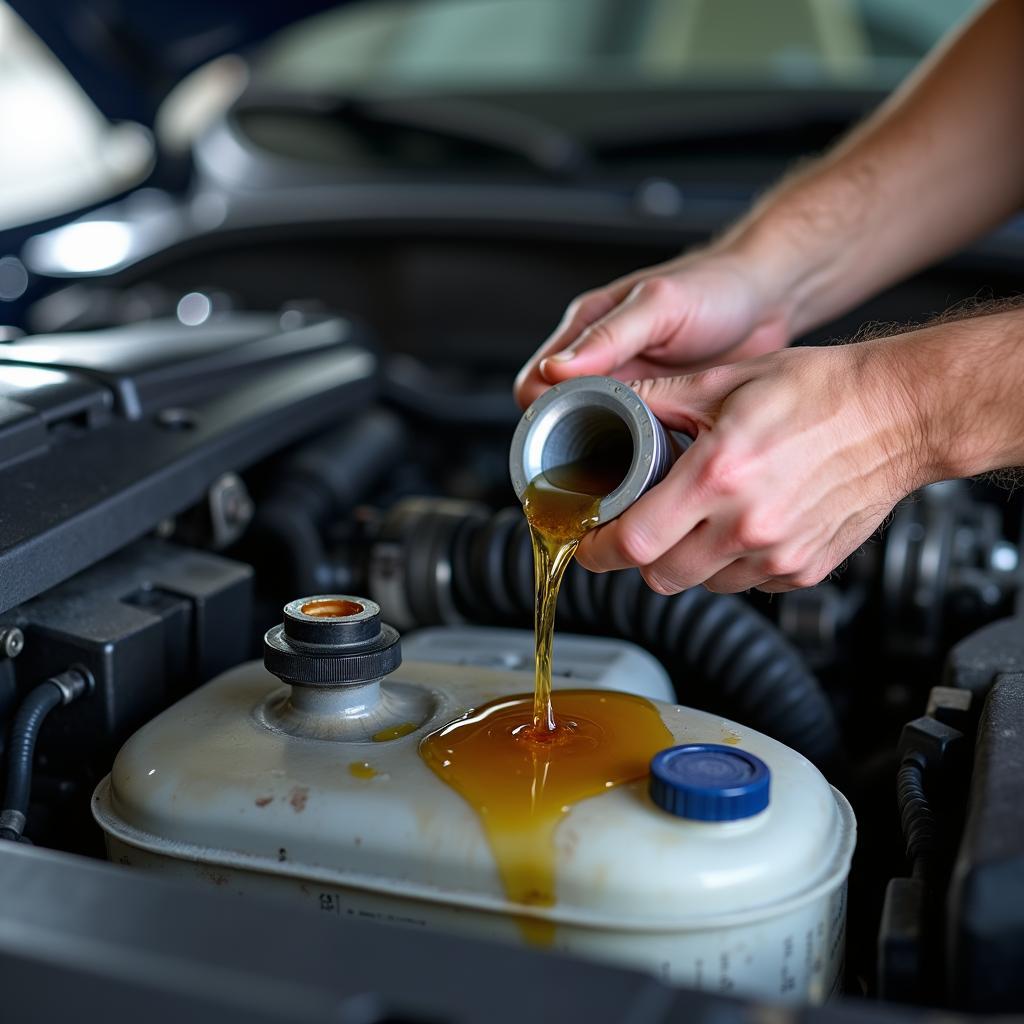Oil service, often referred to as an oil change, is a fundamental aspect of car maintenance that involves removing used engine oil and replacing it with fresh oil. This routine service is crucial for maintaining your car’s engine health, performance, and longevity.
Why is Oil Service Important for My Car?
Imagine your car’s engine as its heart; engine oil acts as the lifeblood. It performs several vital functions:
- Lubrication: Engine oil forms a thin film between moving metal parts, reducing friction and preventing wear and tear. Without proper lubrication, engine components would grind against each other, leading to overheating, damage, and ultimately, engine failure.
- Cooling: As engine oil circulates, it absorbs heat generated by the combustion process. This helps regulate engine temperature and prevents overheating.
- Cleaning: Engine oil contains detergents that collect dirt, debris, and combustion byproducts. These contaminants are then trapped in the oil filter, preventing them from circulating and causing damage.
- Sealing: Engine oil helps maintain a seal between the piston rings and cylinder walls, ensuring optimal compression and engine power.
- Corrosion Protection: Engine oil contains additives that protect metal components from rust and corrosion caused by moisture and acidic combustion byproducts.
What Happens During an Oil Service?
An oil service typically involves the following steps:
- Draining the Old Oil: The car is lifted, and a drain plug located on the oil pan is removed, allowing the used engine oil to drain out.
- Replacing the Oil Filter: The old oil filter, responsible for trapping contaminants, is removed and replaced with a new one.
- Adding Fresh Oil: The drain plug is reinstalled, and the recommended amount and type of fresh engine oil are added to the engine.
- Inspecting Other Fluids and Components: Many mechanics will also check other fluids like coolant, brake fluid, and power steering fluid, as well as visually inspecting belts, hoses, and tires.
How Often Does My Car Need an Oil Service?
The frequency of oil service depends on several factors, including:
- Vehicle Age and Make: Refer to your car’s owner’s manual for manufacturer-recommended oil change intervals.
- Driving Conditions: Frequent stop-and-go driving, extreme temperatures, and towing heavy loads can necessitate more frequent oil changes.
- Oil Type: Synthetic oils generally last longer than conventional oils, extending the time between oil changes.
Traditional recommendations suggest an oil change every 3,000 miles or 3 months, whichever comes first. However, modern vehicles and synthetic oils often allow for extended oil change intervals. It’s essential to consult your owner’s manual and consider your driving habits to determine the optimal oil change schedule for your car.
What are the Signs My Car Needs an Oil Change?
While adhering to the recommended oil change schedule is crucial, be aware of these warning signs:
- Dark or Dirty Oil: Check your engine oil regularly. If it appears excessively dark or gritty, it’s time for an oil change.
- Burning Oil Smell: A distinct burning oil smell inside the cabin can indicate an oil leak or burning oil.
- Increased Engine Noise: If you notice louder than usual engine noise, particularly ticking or knocking sounds, it could signify inadequate lubrication.
- Oil Change Indicator Light: Many modern cars have an oil change indicator light on the dashboard that illuminates when an oil change is due.
What Happens if I Don’t Get Regular Oil Services?
Neglecting regular oil services can lead to several problems, including:
- Reduced Engine Life: Increased friction and wear on engine components can significantly shorten your engine’s lifespan.
- Decreased Fuel Efficiency: As engine components work harder due to friction, fuel economy can suffer.
- Overheating: Inadequate lubrication and cooling can cause the engine to overheat, potentially resulting in severe damage.
- Engine Failure: In extreme cases, lack of oil service can lead to catastrophic engine failure, requiring costly repairs or even engine replacement.
Choosing the Right Oil for Your Car
Using the correct type and viscosity (thickness) of oil is essential for optimal engine performance and protection. Your owner’s manual will specify the recommended oil for your car.
Factors to consider when choosing engine oil:
- Conventional vs. Synthetic Oil: Synthetic oils offer improved performance, longer lifespan, and better temperature resistance compared to conventional oils.
- Oil Viscosity: Oil viscosity is represented by a numerical rating, such as 5W-30. The “W” stands for winter, and the lower the number, the better the oil flows in cold temperatures. The second number indicates the oil’s thickness at operating temperature.
- Oil Additives: Some engine oils contain additives that enhance performance, such as friction modifiers and detergents.
Car Oil Service FAQs:
Q: Can I change my car’s oil myself?
A: While it’s possible to change your car’s oil at home with the right tools and knowledge, it’s generally recommended to have it done by a qualified mechanic to ensure proper procedures and disposal of used oil.
Q: How much does an oil service cost?
A: The cost of an oil service varies depending on factors like location, vehicle type, oil type, and whether additional services are included.
Q: What is the difference between an oil change and an oil service?
A: While the terms are often used interchangeably, an oil service may sometimes encompass a more comprehensive check, including topping off other fluids and a visual inspection of engine components.
Q: How do I dispose of used engine oil?
A: Never pour used engine oil down the drain or dispose of it in the trash. Take it to a certified recycling center or auto parts store that accepts used oil.
Conclusion
Regular oil service is a vital investment in your car’s health, performance, and longevity. By understanding the importance of this routine maintenance task and recognizing the signs that indicate your car needs an oil change, you can contribute to a smoother, more efficient, and longer-lasting driving experience. Remember to consult your owner’s manual for specific recommendations and seek professional assistance when needed.
If you need help with your car’s oil service or have any questions, contact our team of experts via WhatsApp: +1(641)206-8880, or Email: [email protected]. We are available 24/7 to assist you.


